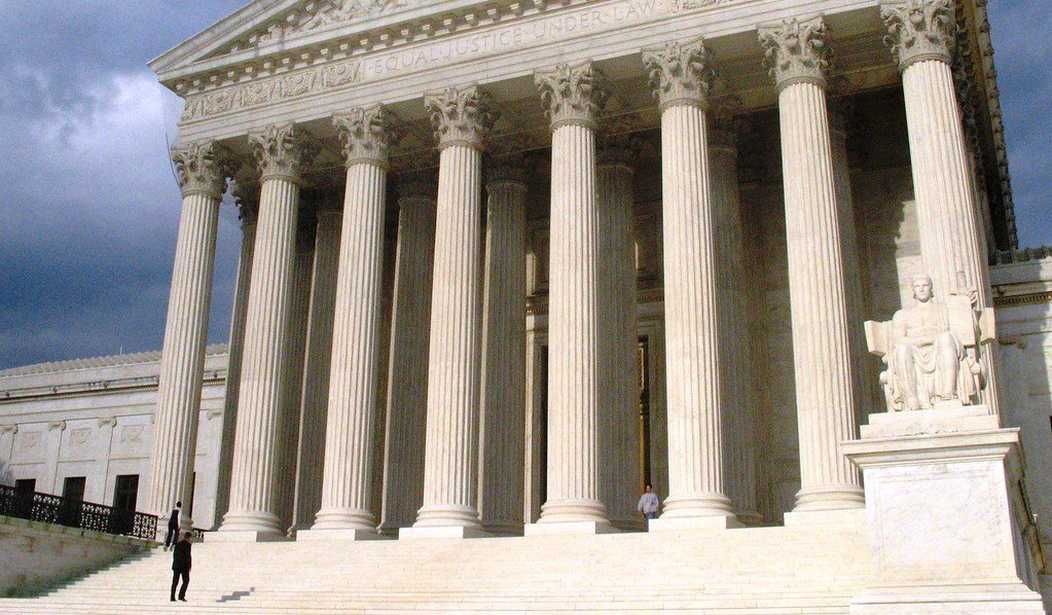Ever since the Supreme Court granted cert in U.S. v. Hemani last week, I've seen a lot of news coverage that doesn't fully explain the issues at hand. There've been multiple headlines about the Supreme Court deciding whether pot smokers can own guns, though the statute at the heart of Hemani deals with firearm possession by any "unlawful" drug user, not just those who use marijuana.
I've also seen a number of comments in response to those headlines from readers who think that it's currently legal to own guns and use marijuana, and that the Supreme Court may decide its illegal to do so. That's not the case at all. Section 922(g)(3) prohibits firearm possession by "unlawful" users of drugs, and the justices will be deciding if that statute is facially unconstitutional or unconstitutional as it applies to Ali Danial Hemani.
By far, the worst news story I've run across comes from KRTV in Great Falls, Montana, which ran a piece riddled with inaccuracies and hot takes that need to be corrected, starting with the very first line of the story.
The Trump administration has asked the Supreme Court to review a case that could restrict regular marijuana users' ability to possess firearms. It's the first time a firearms case has appeared before the court since 2022.
Again, regular marijuana users are already prohibited from possessing firearms under federal law. This is also not the first firearms case that SCOTUS has addressed since Bruen in 2022. In June, 2024 the Court handed down its opinion in U.S. v. Rahimi, declaring that, "[w]hen an individual has been found by a court to pose a credible threat to the physical safety of another, that individual may be temporarily disarmed consistent with the Second Amendment."
While arguments won't likely begin until 2026, the case has already sparked debate in Montana, a state where marijuana is legal and gun ownership is high.
"Statistically, whatever the conservative side of this is, is more likely to be favored, just because of the numbers," said Dr. Paul Pope, a political science professor at MSU-Billings and the department chair of the social sciences and cultural studies department.
The U.S. Supreme Court currently has a 6-3 conservative majority.
Fair enough, but what does Pope think the conservative side of this issue is? Is it a socially conservative position that drug users are inherently dangerous individuals who shouldn't be allowed to possess firearms, or a constitutionally conservative position that barring all drug users from exercising their Second Amendment rights is an infringement on a fundamental civil liberty?
Elizabeth Pincolini, the owner of Billings Alternative Wellness, feels differently. Billings Alternative Wellness is a business on Grand Avenue that helps Montanans obtain medical marijuana cards.
Pincolini questioned how such restrictions would actually work.
"Your medical card is protected under HIPAA law, right? You don't have to disclose your medical history to anyone," she said. "So, it kind of begs the question, how are they going to know?"
Again, it's not a matter of "would" work. This is currently the law, and frankly, it's kind of scary that Pincolini doesn't seem to know that. As to how the feds will know, these charges typically arise during encounters with police. Hemani's home, for instance, was raided by law enforcement, who found marijuana, cocaine, and firearms. Several other cases that have made their way to SCOTUS involve traffic stops where personal amounts of cannabis were discovered along with various firearms. And in the case of Hunter Biden, his own statements about his crack addiction jibed with the timeframe of his purchase of a revolver, which led federal authorities to charge him with violating Section 922(g)(3) and lying about his addiction on his paperwork.
Pope expressed concern about how the case came before the high court. The Justice Department asked the court to intervene after a lower court in 2022, during the Biden administration, struck down laws that criminalized gun possession by marijuana users.
"I think the most important and somewhat disturbing point here, is that the president of the United States is trying to dictate what cases the Supreme Court hears, and they've listened to him," said Pope.
This is the comment that really left me scratching my head. Pope isn't just a political science professor. He's the head of the social sciences and cultural studies department at Montana State University-Billings, for crying out loud.
It's hardly unusual for the Solicitor General to ask the Supreme Court to take a case, especially one where the federal government is the plaintiff. It's certainly not out of the ordinary for the DOJ to appeal a loss to higher courts, including all the way to the Supreme Court, if necessary. I have no idea why Pope would be disturbed by the Solicitor General filing a cert petition in Hemani. Honestly, his reaction would disturb me if I was a student or colleague of Pope, given that he seems to lack a basic understanding of the appellate process.
I don't like the fact that the DOJ specifically asked the Court to take up the Hemani case instead of any of the other four cases dealing with 922(g)(3) that justices have also been considering in conference, but a) it's not out of the ordinary for the DOJ to ask the Court to consider one case and hold on to others dealing with the same issue and b) I understand why DOJ wants Hemani to be the vehicle the Court uses to consider the constitutionality of the statute.
The Trump administration is defending 922(g)(3), and Hemani gives them the best set of facts to use in its defense. Ali Danial Hemani is accused of possessing firearms while illegally using marijuana, but as Solicitor General D. John Sauer made sure to point out in his cert petition, Hemani is also someone whose "actions have drawn the attention of the Federal Bureau of Investigation," for alleged activities in support of the Iranian regime. Of the five cases SCOTUS had to choose from, Hemani is probably the least sympathetic, which works in DOJ's favor.
I don't expect reporters or even college professors to be aware of the intricacies of the Hemani case, but I was honestly shocked by the amount of ignorance on display in this entire report; from a woman who helps people obtain medical marijuana cards who apparently thinks those users can lawfully possess firearms under current federal law, to a political science professor who seems to have no idea that the DOJ regularly appeals decisions to the Supreme Court... and of course, a reporter who not only allowed these statements to go unchallenged, but included them in the news story that aired.
Editor’s Note: The Schumer Shutdown is here. Rather than put the American people first, Chuck Schumer and the radical Democrats forced a government shutdown for healthcare for illegals. They own this.
Help us continue to report the truth about the Schumer Shutdown. Use promo code POTUS47 to get 74% off your VIP membership.








Join the conversation as a VIP Member